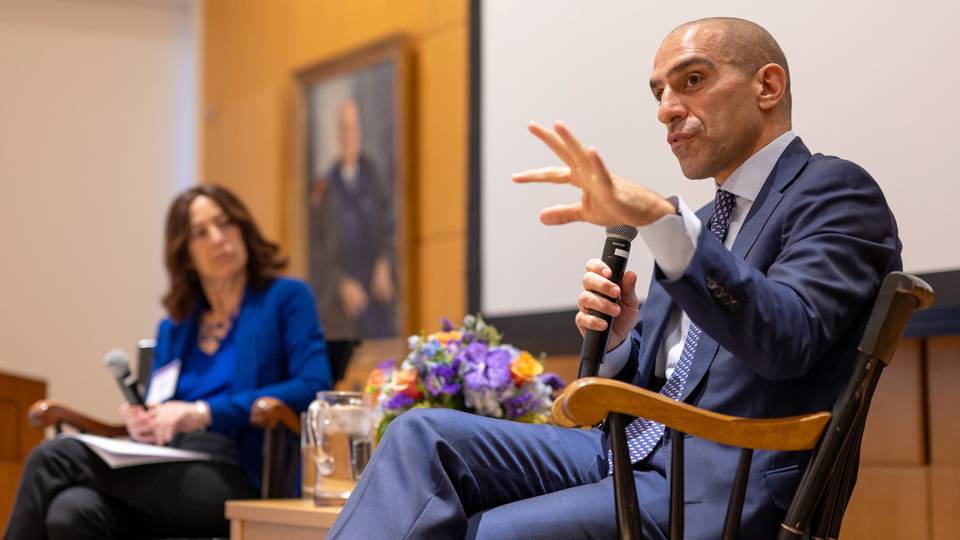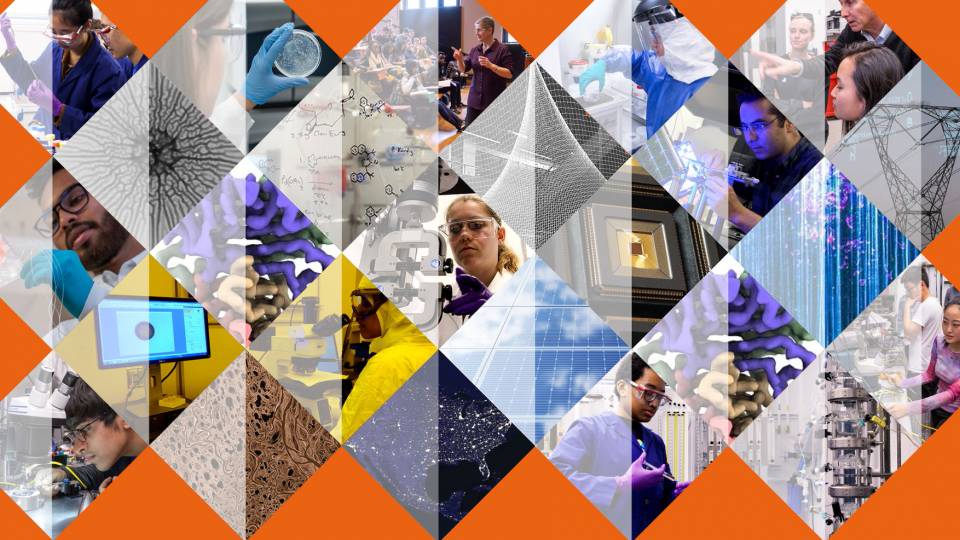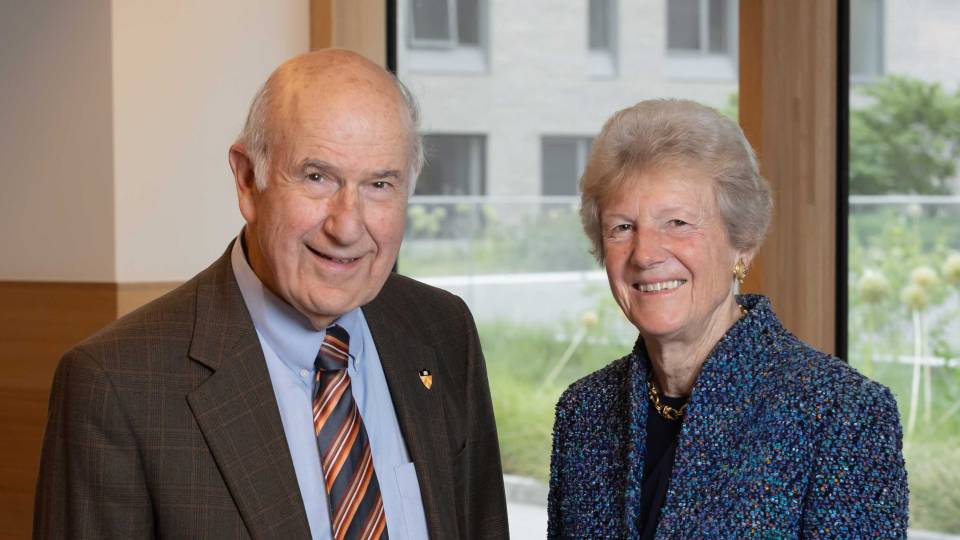Princeton University is launching an initiative on blockchain and its potential to disrupt and redistribute power in society. Supported by four alumni in a combined major gift to Princeton’s Venture Forward campaign, the initiative will convene scholars across disciplines to better understand the potential benefits and pitfalls of the technology.
The rise of cryptocurrencies – digital money with no central governing organization – has followed waves of earlier technological revolutions, from the printing press to the internet, each of which has ushered in profound shifts in the distribution of political and economic power in society. Blockchain, the technology behind cryptocurrencies, does not operate under central control, opening the possibility of innovations and societal change beyond cryptocurrencies, including new types of contracts and communications platforms.
“Technology has always disrupted power, but blockchain is a new platform for doing so. It is very exciting and important to think broadly and deeply about the applications it enables as we also generate innovations that push the boundaries of the technology itself,” said Andrea Goldsmith, dean of the School of Engineering and Applied Science.
The initiative will be based in the School of Engineering and Applied Science, while engaging innovators and scholars across social sciences, public policy, economics and the humanities. It will accelerate fundamental research not only in the underlying technologies of decentralization but also the societal impacts of those technologies. This work will create a vibrant environment for teaching and learning around these technologies and their impacts.
The initiative received initial funding from four alumni who are leaders in technology, investing and blockchain. The donors are: Peter L. Briger, Jr., a 1986 graduate and principal and co-chief executive officer of Fortress Investment Group; Joseph M. Lubin, a 1987 graduate and a co-founder of the blockchain and cryptocurrency platform Ethereum and CEO and founder of ConsenSys, a blockchain company; Daniel W. Morehead, a 1987 graduate and founder and chief executive officer of Pantera Capital; and Michael E. Novogratz, a 1987 graduate and chief executive officer of Galaxy Investment Partners.
“These gifts enable Princeton to pursue a pioneering research initiative with the capacity to illuminate the impact of blockchain technology and its potential societal implications,” said President Christopher L. Eisgruber. “Through Princeton’s distinctive approach to interdisciplinary research and teaching, the initiative will lead to a better understanding of the possibilities of this important new technology. I am grateful for the forward thinking and generous support of this extraordinary group of alumni.”
Blockchain, a digital ledger of transactions that is open for all to manage and see yet is secure against making false entries, is quickly being developed for uses beyond digital currencies. Several companies, for example, are using blockchain for creating and managing contracts. Some technologists see blockchain as the basis for a next generation of the internet, known as Web3, in which disparate users not only generate content, such as social media posts, but also own and manage the distribution platforms.
Lubin, whose Princeton degree was in electrical engineering and computer science, said a chief aim of the gift is to engage Princeton’s strength not only in engineering but also in the social sciences. “It is a very powerful technology that has the power to transform the economic and social model of the internet as we know it. Our collective understanding of both the benefits and drawbacks of digital technology has advanced greatly over the past two decades of digital innovation. The emergence of Web3 presents an opportunity for societies to collectively take stock and evaluate how this new era of digital innovation can best serve their citizens.
“Our realization of the promise of Web3 is contingent on it being built in a way that is sustainable and well-governed, distributed and resilient, as well as open and participatory,” Lubin said. “The social sciences have a crucial role to play in helping define a vision for how Web3 can achieve these objectives, as well as in establishing the principles that should guide our innovation, to ensure that Web3 can best serve communities globally.”
Jaswinder Pal Singh, professor of computer science who is leading the initiative, said such decentralized technologies could be transformative for society and that new, highly collaborative research is critical for deploying the new technologies in ways that result in the most benefit and least harm.
“It has been a longstanding problem in computer science: How to get agreement or consensus among a distributed set of entities who don’t trust one another. How do you get them to agree that something is the truth?” said Singh, who also is a co-founder of a blockchain-based company. “The bitcoin blockchain solved that problem in an innovative and powerful way. It has, for the first time, allowed people to agree that something has happened and to achieve the necessary trust without the need for a centralized authority, with code that is visible to everyone.”
This has implications not just for currencies but for many kinds of assets, information and governance, he said. Companies are already building many new kinds of technologies, creating entire new fields such as decentralized finance, known as DeFi. While the initiative is not intended to promote cryptocurrencies or any particular use of blockchain, it will advance research broadly in this emerging field.
“We are at a very early stage in understanding the opportunities and challenges associated with these technologies and their applications,” Singh said. “The decentralization of trust may be just as powerful and transformative as the worldwide web. It may transform existing systems and lead to new applications that we cannot even imagine today, with far-reaching impact for society. We need to be engaged not just in the technology and its uses but also in the economics, governance and policies associated with them, and to do so together with industry. Getting it right will require fundamental, interdisciplinary research, and education, and close engagement with the fast-moving startup community.”
The initiative on decentralization will accelerate three areas of work at Princeton: the underlying engineering behind blockchain and related technologies; innovative uses of the technologies not only in finance and economics but also in areas such as voting and news; and the implications that such technologies could have for society.
“It’s just such a cross-cutting set of applications, which is perfectly tailored to Princeton because we have great strength in all of these application areas, we are emerging as the center of a regional hub of technology entrepreneurship, and we have a tradition of educating students who work and think across disciplinary boundaries,” said Goldsmith. “The technology is moving fast, so bringing a wide variety of experts together with the engineers who are building these platforms is critically important for students and for society.”
Princeton researchers also will partner with external entities, including technology companies, to move innovations into the market, while regularly convening academics and thought-leaders about the impacts of such technologies.
Goldsmith said work on the engineering side will bring together Princeton’s already strong research groups in networking, consensus algorithms, optimization, game theory, cryptography and data structures. Work on applying the research will include cross-disciplinary collaborations within or beyond Princeton in areas such as economics, finance, policy and humanities.
“We will be knitting together the advances in engineering with the transformative applications of those new platforms, and also understanding the societal implications of those changes in technology,” said Goldsmith. “It is an excellent place for Princeton to take the lead.”







